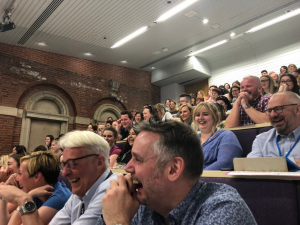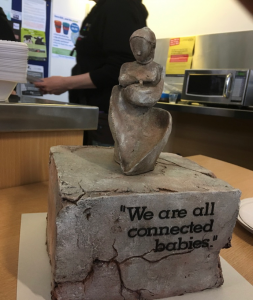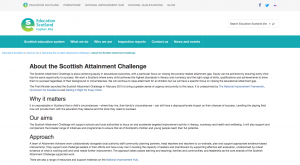Let’s disrupt the real disruptors!!!
I love the idea that InnovatED is going to devote a whole month to celebrating the mavericks and mayhem makers, the change agents and secret agents, the innovators and instigators and anyone not so classified who is trying to make change in education.
I think I might qualify for inclusion. I was once profiled in a series entitled The Innovators. If you are ever desperate for distraction, you can use this link http://www.agent4change.net/innovators/1861-the-innovators-27-david-cameron.html
The unfortunate truth, or even the inconvenient truth, with due respect to Al Gore, is that it is hard to make change in education and the change that we make as “innovators” is rarely disruptive. Millions watched Sir Ken Robinson’s TED talk about education’s fatal assault on creativity, how many changed their practice? I am not aware of an increasing wave of Leonardos breaking into the worlds of art or science after an inspirational 18 minutes on You Tube. ResearchED has blossomed into an international phenomenon with a conference itinerary that must need coordination from Jules Verne, but some of its leading lights still feel that they haven’t yet vanquished Brain Gym. Frankly, if you can’t still the twitchings of Brain Gym, wholesale educational change might be a bridge too far.
Independent Thinking is a wonderful hydra-headed force for educational change, continually reminding the world that “there is another way”, but it seems to remain “the path less travelled”
I am not dismissive of the possibility of change. Goodness knows, I have been trying to achieve it for longer than most of my handful of readers have been alive and I am with McFadden and Whitehead (https://www.youtube.com/watch?v=VuAZTWGfQTs) in believing that “there ain’t no stopping us now, we’re on the move”. I just recognise that it takes time and that it is much easier to achieve in a context where you have power and influence. I am also convinced that change in education is more likely to translate into sustained difference when it is not overly disruptive.
Change needs traction. It has to have grip on the ground and take people forward from where they currently are. It has to respect context. As I am unduly fond of saying, successful schools adapt more than they adopt. Change should be coherent. Like a good narrative it should build on preceding chapters and be rooted in those that we seek to write. Otherwise we paint on wet walls – another image which I threaten with overwork!!
All of this begs the question, who are the real disruptors?
Step forward the ideologues with influence, the politicians with power and a lust for legacy and those in positions of executive power who prefer intervention to stability and headlines to articles.
One needs to ask how much disruption has been created by inflicting a belief that structures change practice, certalnly, in the context of England, but, undoubtedly, more widely. We have seen so many models of school organisation being imposed at worst or permitted at best, in the belief that such change would improve practice. It may be possible to find examples where that might be the case, but, at the time of writing, we are seeing fragmentation, fragility and failure on a worrying scale.
We have seen so much disruptive change in the name of school autonomy when the reality looks much more like the decentralisation of blame.
It is hard to see the current crisis in staff recruitment and retention as anything other than a disruptive failure in workforce planning buy successive governments, more concerned with “liberating the system” than actually making it work.
One also needs to ask how disruptive the current workload for school leaders and teachers is. I see so many tired and frazzled colleagues who, in William McIlvanney’s words, “madly try to dream ourselves a beach”
Don’t your retired colleagues look well?
There is a very serious point in all of this. Disruption, especially imposed, ill-considered, founded on an unjustified certainty and enforced through mechanisms of accountability and funding, will certainly bring change. Its track record on progress is a lot more questionable.
Hence my title. We really need to recognise who the real disruptors are and question whether they are any more than the assassins of Humpty Dumpty, unable to put the pieces together again even in the configuration that they initially sought.
We can only break a system when we have thought through how we will rebuild it. When we do so we must offer the reassurance and support that allows change to feel constructive, rather than disruptive. We need to end the current love affair with iconoclasm. On the world stage that has brought a Trump presidency and I, for one, am not sleeping any better as the Doomsday Clock is poised at two minutes to midnight. That sort of iconoclasm seeks enemies rather than allies. We can see elements of this in the current educational debate where politicians rail against “experts” and educationalist savage each other in the WWF of Twitter.
If we want progress, we need alliances and not conflicts. If we want more than change we need to disrupt the disruptors and get alongside the constructors



 One student made the most amazing cake!
One student made the most amazing cake! 

